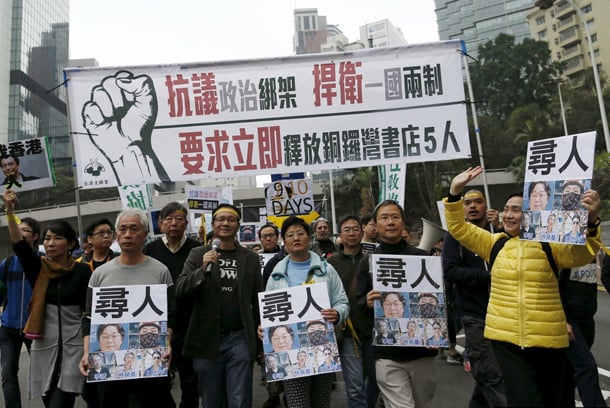China Kidnappings in Spotlight as Canada Mulls New Trade Deal
Advocates call Trudeau to loosen economic ties with nation under fire for rights abuses.

Demonstrators hold portraits of five missing booksellers. Photo by Tyrone Siu, Reuters Media Express.
High-profile kidnappings and arrests now dominating debate in China have a Canadian rights organization saying Ottawa should step back and rethink its relationship with Beijing.
The advice comes weeks after reports from Parliament Hill said Prime Minister Justin Trudeau is planning to deepen ties with China and perhaps seek a trade deal.
But now is not the time for such initiatives, according to Cheuk Kwan of the Toronto Association for Democracy in China, a human rights group formed after the 1989 Tiananmen Square massacre.
''I think this is the time to cool off and say, 'We're not sacrificing our Canadian values on human rights for the sake of trade,''' Kwan said.
Kwan says the concern centres on the case of four booksellers linked to a Hong Kong store that sold political texts banned in Mainland China. They all recently went missing from Hong Kong. Unlike Mainland China, Hong Kong has guaranteed freedom of expression under the terms of its reunification with China in 1997.
The disappearances have disturbed many of Beijing's critics, who worry that Mainland Chinese authorities were involved.
Another man connected to the store, Gui Minhai, disappeared from his home in Thailand and reappeared in China in the hands of authorities this week confessing to crimes. International critics link Gui's kidnapping and televised apology to a rise in public confessions used to humiliate political opponents. Many observers say the confessions appear forced and they fear China is growing bolder in its push to silence dissent.
Ottawa silent on kidnappings
Gui, who had been missing from Thailand since October, reappeared in China confessing to a hit-and-run driving death he was charged with in 2004, according to Chinese state run media service, Xinhua.
International media reports say Gui has Swedish citizenship and was also known to be writing a book about Chinese president Xi Jinping. Human rights advocates charge his disappearance was likely unrelated to the fatal incident.
Another Swedish human rights advocate, Peter Dahlin, was detained in China in early January and appeared on Chinese state television this week, making a questionable apology for his activities.
Reporters Without Borders released a statement Thursday renewing calls for sanctions against the state-owned broadcaster for airing the confessions.
Kwan said the actions are worrisome and suggest a more brazen abuse of civil liberties by Beijing as it reaches outside its borders to harass its critics.
The Trudeau government has yet to mention any of the recent cases, and Kwan fears Canada may be choosing to ignore the aggressive actions of China's authorities in the pursuit of commerce.
Canada's controversial arms deal with Saudi Arabia -- brokered under the Conservative government and allowed to pass by the Liberals -- gives Kwan reason to fear Ottawa will allow commerce to outweigh any issues of human rights.
''Seeing the recent Saudi deal, I'm not that hopeful [Ottawa will change course],'' he said. ''I'm thinking maybe it's business as usual.''
Pressure on governments, NGOs
China's recent behaviour is a throwback to a different time, said a professor of Chinese politics at Brock University. Charles Burton said the slew of incidents is ''disturbing'' and more in line with the government of the 1960s and '70s.
During that time, the smallest critique of Chinese authorities could result in torture, forced confessions, humiliation punishment, imprisonment or even death for those within China.
But now, Burton said, Beijing's appears to be reaching beyond China in an attempt to intimidate governments and international human rights groups.
He cited the case of Kevin Garratt, a Vancouverite detained in China since August 2014, as an example of the Chinese government's abuse of process.
Garratt ran a coffee shop in northern China and is accused of espionage by Chinese authorities.
His arrest came shortly after the Canadian government said it had reason to believe state-backed Chinese hackers were involved in hacks on Canadian government servers, Burton said.
''The parallel between the two and the timing seems more than coincidental,'' Burton said. ''We have no evidence Mr. Garratt was involved in any espionage whatsoever.''
He said now the Liberal government may be sensitive about what it says about China with financial repercussions on the line, especially after promises for infrastructure spending it made during the 2015 election campaign.
Kwan said his organization has yet to have a meeting with the new Liberal government, but that he intends to raise his concerns with it in future. ![[Tyee]](http://thetyee.ca/ui/img/ico_fishie.png)
No comments:
Post a Comment
Comments always welcome!